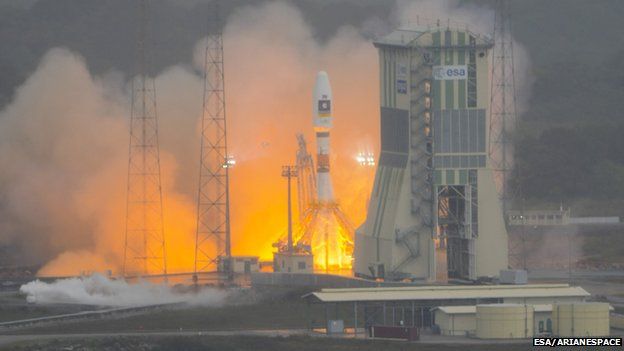
-
25 June 2015
- From the section Science & Environment

The biggest commercial rocket campaign in history has been announced by OneWeb.
The British Channel Islands-registered company has acquired more than 60 launchers to help put up its proposed satellite broadband network.
OneWeb envisages placing 648 spacecraft in orbit to take affordable internet connectivity to every part of the globe.
The firm used a London press conference to detail its plans.
This included introducing all of the key partners in the endeavour.
Along with European aerospace giant Airbus, which was announced last week as the satellite manufacturer, OneWeb presented Bharti Enterprises, Coca Cola, Group Salinas, Hughes Network Systems, and Intelsat.
Chip-designer Qualcomm and the Virgin Group already had seats on the board.
“We have put together an incredible team and we have an ability to execute on our model,” said OneWeb CEO Greg Wyler. “We have funding, we have spectrum, chip technology, satellite manufacturing, launchers, and then markets – the broad pieces of the puzzle to build a system of this size.”
Virgin’s Sir Richard Branson said that he would be making available at least 39 of his LauncherOne rockets to assist with the deployment of the satellite constellation.
This vehicle, which is based on Virgin Galactic’s space tourism system, has not actually had its debut flight yet, and when it does enter service will probably only launch between one and three satellites at a time. That makes the involvement of the long-established Arianespace all the more important. It is the commercial operator of the Soyuz launcher.
OneWeb says it has a firm acquisition order for 21 of these Russian-made rockets. The vehicles would orbit the satellites in large batches of about 36. At some point, Arianespace may even make available its Ariane rocket. In publicity material released on Thursday, an artist’s impression depicted the forthcoming Ariane 6 rocket painted in the OneWeb livery.
“The special characteristic we’ll bring is in the replenishment role,” said Virgin Galactic’s CEO, George Whitesides. “And if there is a problem with a particular satellite, we can help fix that. I think it’s a very smart strategy, and what I think people should get is that it is a very complementary strategy between the different launch vehicles.”
It is difficult to overstate the challenge of the OneWeb proposition.
Its constellation would be 10 times the size of the largest commercial satcom network currently in the sky.
To make the project financially manageable, it will need not only some sizeable loans but also considerable direct investment from its partners, and part of Thursday’s event was to announce that OneWeb had raised $500m of funding from those supporting companies.
One aspect of key interest is the price of each individual 150-kilo satellite. The aim is to get the unit cost to half a million dollars or less – something unheard of in the industry.
“Yes, the cost per satellite will be about half a million, which is really tremendous for company that normally makes satellites for a hundred million and upwards,” said Airbus CEO Tom Enders. “We do it by being ingenious and creative.”
OneWeb expects to place the spacecraft in 20 orbital planes at an altitude of about 1,200km. They would connect to small user terminals on the ground.
These terminals would then act as hubs, linking phones and computers. The low altitude of the constellation should mitigate the delay, or latency, that users experience as they send and receive data over the system.
Mr Wyler has history in this business. He started the O3B satellite network, which is doing something very similar, but with just 12 mid-orbiting spacecraft.
The “O3B” is a reference to “Other Three Billion” – an estimate of the numbers of people around the world who have little or no broadband access.
The rollout of the new constellation is not expected to begin until 2017 at the earliest.
Because OneWeb is British-based, the UK, as the “launching state”, carries certain liabilities, and that means the UK Space Agency is going to be very busy in a licensing capacity, ensuring the project’s activities meet the highest standards. One of these is an insistence that old satellites are disposed of in accordance with international space debris guidelines.
“The project demonstrates the importance of satellites in space to the communications infrastructure, and it’s fantastic that there is great UK interest and potentially UK involvement,” UKSA CEO Dr David Parker told BBC News.
“There are enormous technical challenges for this project, but they’ve obviously got an interesting team to try and solve them.”
Mr Wyler said he would be announcing significant investments in Britain connected with the project in due course.
Jonathan.Amos-INTERNET@bbc.co.uk and follow me on Twitter: @BBCAmos
